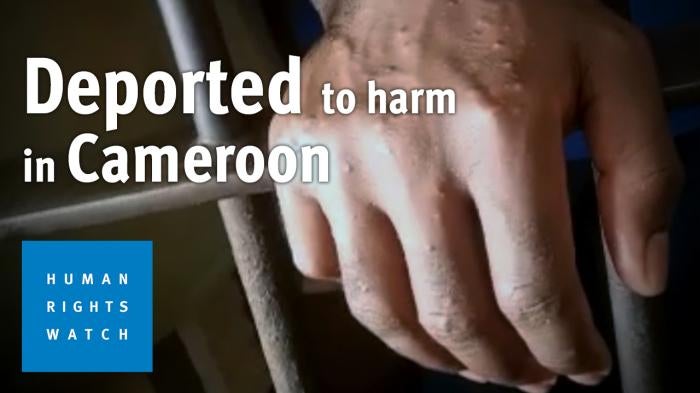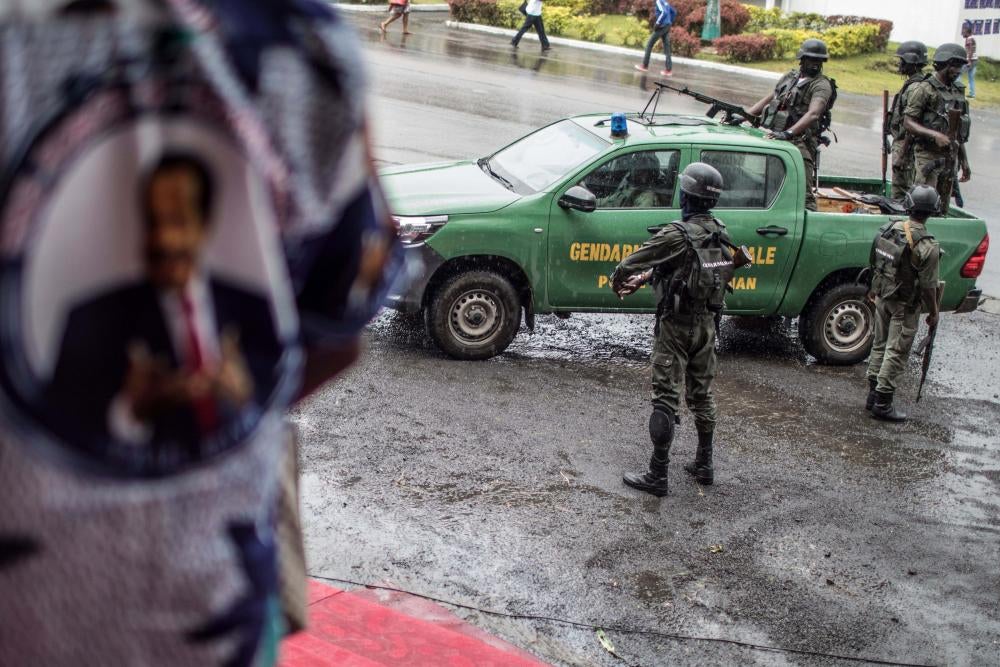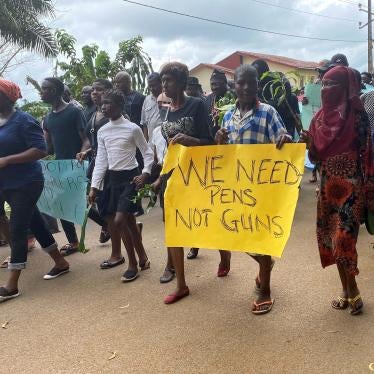(Washington, DC) – Cameroonian authorities subjected dozens of asylum seekers deported by the United States to serious human rights violations between 2019 and 2021, Human Rights Watch said in a report released today.
The 149-page report, “‘How Can You Throw Us Back?’: Asylum Seekers Abused in the US and Deported to Harm in Cameroon,” traces what happened to the estimated 80 to 90 Cameroonians deported from the United States on two flights in October and November 2020, and others deported in 2021 and 2019. People returned to Cameroon faced arbitrary arrest and detention; enforced disappearances; torture, rape, and other violence; extortion; unfair prosecutions; confiscation of their national IDs; harassment; and abuses against their relatives. Many also reported experiencing excessive force, medical neglect, and other mistreatment in Immigration and Customs Enforcement (ICE) custody in the US.
“The US government utterly failed Cameroonians with credible asylum claims by sending them back to harm in the country they fled, as well as mistreating already traumatized people before and during deportation,” said Lauren Seibert, refugee and migrant rights researcher at Human Rights Watch. “The Cameroon and US governments need to remedy these abuses, and US authorities should provide opportunities for wrongly deported Cameroonians to return and reapply for asylum.”
By returning Cameroonians to face persecution, torture, and other serious harm, the US violated the principle of nonrefoulement, a cornerstone of international refugee and human rights law.
Between December 2020 and January 2022, Human Rights Watch interviewed 41 deported Cameroonian asylum seekers, 4 asylum seekers in the US, and 54 other people in the US and Cameroon, including relatives and friends of those deported, witnesses to abuses, lawyers, immigrant rights activists, and experts. Human Rights Watch collected and analyzed US asylum and immigration documents of deported people, as well as photographs, videos, recordings, and medical and legal documents corroborating accounts of mistreatment in Cameroon.
Cameroon has faced humanitarian crises in several regions in recent years. Respect for human rights has deteriorated and the government has increasingly cracked down on opposition and dissent. Violence since late 2016 by government forces and armed separatist groups in Cameroon’s two Anglophone regions has caused mass displacement, as have intercommunal violence and ongoing conflict with Boko Haram in the Far North region.
“We put all our hope in the USA when we went to seek refuge,” said a 37-year-old man who was deported to Cameroon in October 2020. “We did not imagine the US would return us like that.” He spent nearly three years in US immigration detention and was arbitrarily detained in Cameroon after his return. He remains in hiding.
The people interviewed were deported during the Trump administration, which was characterized by hardline immigration policies, narrowed access to asylum, and racist, anti-migrant rhetoric. Though conditions in Cameroon had not improved, the grant rate for asylum or other protection for Cameroonians by US immigration courts dropped by 24 percent between fiscal years 2019 and 2020. The US deported over 100 Cameroonians in 2020.
The Biden administration took the positive step of cancelling a February 2021 deportation flight to Cameroon. However, it deported several Cameroonians in October 2021 and has failed to designate Temporary Protected Status for Cameroon, despite conditions making return unsafe.
Nearly all of the deported people interviewed had fled Cameroon between 2017 and 2020 for reasons linked to the crisis in the Anglophone regions. Human Rights Watch research indicates that many had credible asylum claims, but due process concerns, fact-finding inaccuracies, and other issues contributed to unfair asylum decisions. Lack of impartiality by US immigration judges – who are part of the executive branch, not the independent judiciary – appeared to play a role. Nearly all of the deported Cameroonians interviewed – 35 of 41 – were assigned to judges with asylum denial rates 10 to 30 percentage points higher than the national average.
ICE also failed to protect confidential asylum documents during deportations, leading to document confiscation and apparent retribution by Cameroonian authorities.
Between 2019 and 2021, Cameroonian police, gendarmes, military personnel, and other officials detained or imprisoned at least 39 people deported from the US. Authorities detained many without due process or in inhumane conditions, for periods ranging from days to months. Some were held incommunicado.
Human Rights Watch documented 14 cases of physical abuse or assault of 13 deported people, 13 by Cameroonian authorities – including 9 in detention – and 1 by armed separatists. State agents raped three women in custody, subjected a man to forced labor, and severely beat returnees, often during interrogations. Several of these cases amount to torture.
A woman deported in October 2020 said she was tortured and raped by gendarmes or military men during six weeks in detention in Bamenda, North-West region: “Every two days ... they were using ropes, [rubber] tubes, their boots, military belts ... They hit me all over my body. They said that I’ve destroyed the image of Cameroon ... so I had to pay for it.”
State agents harmed or targeted the family members of at least seven deported people. While looking for returnees, government forces allegedly shot and killed a woman’s sister, abducted a man’s 11-year-old son, and severely beat a man’s mother. Others were arbitrarily detained, extorted, and harassed.
Cameroonian authorities threatened and abused returnees not only for reasons linked to why they initially fled, but also for seeking asylum in the US, and for actual or imputed opposition to the government. “[Officials] said ... ‘You people left here, you ran ... to the US, telling lies about the government,’” said a woman deported in October 2020.
Nearly everyone interviewed also cited mistreatment during US immigration detention, transfers, or ICE flights. ICE detained all but one of the 41 asylum seekers interviewed for prolonged and unnecessary periods, an average of 1.5 years. Human Rights Watch documented 24 cases of alleged excessive force, cruel or inhuman treatment, or other physical abuse by ICE officers, other officials, or ICE contractors against 18 Cameroonians subsequently deported.
Deported Cameroonians have yet to receive a remedy for harms experienced. As of January, many remained in grave danger in Cameroon or struggled to survive after fleeing again. Human Rights Watch and members of the Cameroon Advocacy Network (CAN), a coalition of immigrant rights groups and Cameroonian immigrants in the US, urged the US government to grant Cameroonians deported between 2020 and 2021 humanitarian parole to return to the US for “urgent humanitarian reasons.”
“The suffering that Cameroonians deported by the US have been through is heartbreaking and makes it crystal clear that Cameroon is not safe for return,” said Daniel Tse, CAN coordinator. “If the Biden administration hopes to make the US immigration system more humane, it should rectify the wrongs done to Cameroonian asylum seekers and halt deportations to Cameroon.”
Quotes from the report
All of those quoted are identified with pseudonyms for their safety.
On post-deportation abuses in Cameroon
“Paul,” deported in October 2020: In January 2021, military personnel assaulted Paul, deported in October 2020, at his mother’s home in the South-West region. “Four military guys broke the door and came inside.... They started beating me.... They said, ‘You were deported from America?... You are the ones sponsoring the Amba [separatist] fighters.’”
“Marie,” deported in October 2020: In January 2021, men in black uniforms assaulted Marie at a checkpoint en route to Bamenda. “They started beating me... They said, ‘Here’s the Ambazonian ... destroying the name of the country.’... They used some whip ... on my neck and back... They slapped me ... I fell on the ground. They ... kicked me ... the pain was too much.”
“Richard,” deported in October 2020, said at New Bell prison in Douala, from October to November 2020: “I was kept in a dark room, only given two slices of bread for the whole day ... [Officers] beat me ... [with] batons ... and a military belt ... and their cutlasses ... I was tortured for 14 days, every day, three times a day... They were making me feel that’s the end of my life.”
“George,” deported in October 2020: Military men severely beat his 60-year-old mother in the South-West region in December 2020. “Since they could not find me ... five of them were beating her ... with a military belt... She fell down crying, so then they kicked her... They were hitting her with sticks... They left her to lie there... People in village came and took her to the hospital.”
On ICE failure to protect confidential asylum documents
“Maxwell,” deported October 2020: “When we were leaving ... I was shouting and screaming that I need to take some documents out of my bags, but [ICE] never gave me any attention. In Cameroon, when we arrived ... [police] asked, ‘Did you ask for asylum in America?’ I said no... [T]hey said I should shut up, that I was lying, because they found every piece of paperwork in my bag ... proving that I asked for asylum.”
On abuses during US immigration detention and deportations
“Thierry,” deported October 2020: “I went to the US to seek asylum for the persecution I experienced in my country. I was just so sad, because I did 2 years 10 months [in detention], and I am not a criminal.”
“Christian,” deported October 2020, said at a US immigration detention center: “They put me face down on the ground. One ICE officer put his knee on my neck, pushing with so much pressure ... I was crying. I said, ‘Please, please, I can’t breathe.’... They forced me inside the game room ..., forced my head onto the ping-pong table ... Some were hitting me. One twisted my arm ... like he was going to break it.... They took my fingerprint by force.”
“Robert,” deported November 2020: “[ICE] put me in a ‘Wrap’ [or similar full-body restraint] because I was refusing to get in the plane... [T]hey tie your legs and your hands, each is connected to each and you can’t sit up straight. It’s a form of punishment.... I told them God will judge them. The ICE officers told me I should go to hell, that whatever complaint I do, the case will go nowhere.”
On unfair US asylum denials
“Richard,” deported October 2020: “When you’re trying to give an explanation of what happened, [the asylum officer] wouldn’t give you an opportunity. He would just say, ‘OK, OK’... Sometimes he would speak so fast that I didn’t understand, and he would threaten, ‘This is the last time I’m repeating myself,’ and if I don’t give him answers ... he will not interview me anymore. I was so tense.”
“Michael,” deported November 2020: “I wasn’t understanding the [immigration] judge or government lawyer sometimes, and sometimes they didn’t understand me... They would say ‘speak louder,’ and if I said I didn’t understand ..., they thought maybe I wanted to escape from the question.”

















